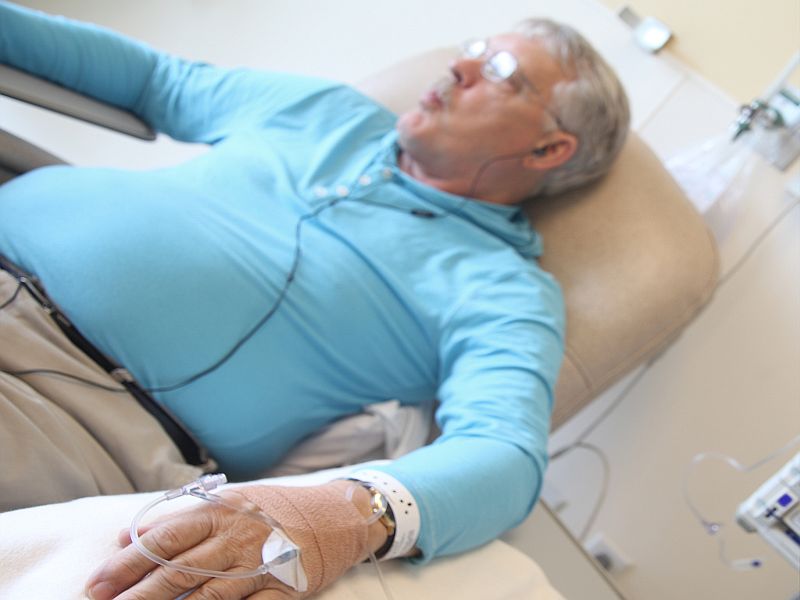
Wednesday, August 24, 2016

WEDNESDAY, Aug. 24, 2016 (HealthDay News) -- Cancer is on track to become the leading cause of death in the United States, closing in on heart disease as America's number one killer, a new government study shows.
Heart disease has consistently been the leading cause of death for decades, and remained so in 2014, according to a report from the National Center for Health Statistics (NCHS) at the U.S. Centers for Disease Control and Prevention.
But the gap between heart disease and the second-leading cause of death, cancer, has been narrowing since 1968, the researchers said.
Cancer actually surpassed heart disease as the leading cause of death for 22 states in 2014, the study found. Back in 2000, Alaska and Minnesota were the only two states where cancer killed more people than heart disease.
In addition, cancer is now the leading cause of death for a number of minority groups, including Hispanics, Asians and Pacific Islanders, the report showed.
"It's been edging this way for a while," said co-author Robert Anderson, chief of the Mortality Statistics Branch at the NCHS. "We've taken for granted that heart disease is the leading cause of death, but now because of prevention efforts and advances in treatment, we're making substantial progress with heart disease, to the point where now it's roughly on par with cancer."
Annual heart disease deaths have decreased nationwide from a peak of just over 771,000 in 1985 to nearly 597,000 in 2011. In the meantime, cancer deaths have nearly tripled from just under 211,000 in 1950 to almost 577,000 in 2011, the report stated.
Dr. Mariell Jessup is a spokeswoman for the American Heart Association. She pointed out that new medicines have made it easier for people to control their blood pressure and cholesterol, treatment advances like angioplasty and heart bypass surgery saves the lives of many heart patients, and more people have quit smoking and started eating healthier diets.
"One could argue that we're doing a better job of keeping people with heart disease alive," said Jessup, who is a professor at the Hospital of the University of Pennsylvania in Philadelphia. "It's not that people aren't experiencing heart disease, but they're not dying from it."
Another expert agreed, with a twist on the thinking.
Essentially, modern medicine has gotten so good at dealing with heart disease that people are living much longer, making them more apt to eventually develop cancer, said Dr. Richard Schilsky. He is chief medical officer for the American Society of Clinical Oncology.
"We have to keep in mind that everyone's going to die eventually from something. Any time we reduce the risk of death for any particular cause, we increase the risk you're going to die from another cause," Schilsky explained.
"Cancer is a disease that is fundamentally associated with aging. If you outlive all the competing causes of mortality, there's a greater and greater likelihood that you're going to get cancer," Schilsky added.
That view is reflected in the states where cancer has overtaken heart disease, said Rebecca Siegel, strategic director of Surveillance Information Services for the American Cancer Society.
In those states, people seem to be healthier overall than in states where heart disease reigns supreme. Death rates for both heart disease and cancer were lower in the states where cancer was the leading cause of death, Siegel said.
"It's not that cancer rates are high in those states at all," Siegel said. "We all have to die from something, right?"
She added that heart disease treatment and prevention has benefited from rapid progress because it's a more narrow field of medicine.
"Heart disease is basically one disease, whereas with cancer we're looking at more than 100 different diseases," she said. "You have very effective ways to prevent and treat heart disease, and we've had them for quite some time, whereas knowledge about the biology of cancer and how to prevent it and treat it is still in its infancy."
In recent years -- between 2011 and 2014 -- heart disease and cancer deaths have both increased in roughly parallel fashion, the report noted.
Heart disease deaths increased by 3 percent between 2011 and 2014, from 596,577 to 614,348, while cancer deaths increased by 2.6 percent during the same period, from 576,691 to 591,699, the findings showed.
These increases could be related to the obesity epidemic, Siegel suggested.
"The obesity epidemic is catching up with us," she said. "It's overcoming our ability to prevent and treat heart disease, and there are a lot of cancers that are also associated with obesity."
The report was published online Aug. 24 in the CDC's NCHS Data Brief.
SOURCES: Robert Anderson, Ph.D., chief, Mortality Statistics Branch, National Center for Health Statistics (NCHS), U.S. Centers for Disease Control and Prevention; Rebecca Siegel, MPH, strategic director, surveillance information services, American Cancer Society; Richard Schilsky, M.D., chief medical officer, American Society of Clinical Oncology; Mariell Jessup, M.D., professor, Hospital of the University of Pennsylvania, Philadelphia, and spokeswoman, American Heart Association; Aug. 24, 2016, NCHS Data Brief, online
HealthDay
Copyright (c) 2016 HealthDay. All rights reserved.
News stories are provided by HealthDay and do not reflect the views of MedlinePlus, the National Library of Medicine, the National Institutes of Health, the U.S. Department of Health and Human Services, or federal policy.
- More Health News on:
- Cancer
- Health Statistics




























.png)












No hay comentarios:
Publicar un comentario